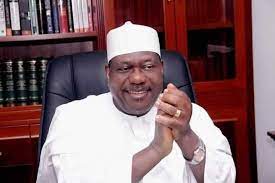Governors from the southwest geo-political zone have asked for the constitutional validation of Nigeria’s six geopolitical zones and converting same to federating units.
They also called for the weakening of the nation’s administrative centre and made a case for the allocation of more powers to the federating units and states.
The governors, who also sought an amendment to Section 44 (3) which gives power to the central government to exploit mineral oils and gas, demanded such powers be given to states within their various domains.
These were some of the positions advanced by the governors on behalf of stakeholders from the region, at the ongoing review of the 1999 Constitution by the N ational Assembly.
In a position paper presented to the lawmakers from the zone at a closed door parley in Abuja, the governors agreed to present a common position during the constitution review.
The paper was entitled ‘Proposals for the Review of the Constitution of the Federal Republic of Nigeria 1999 (As Amended): Presentation by South-West Governors’ Forum.’
Although, Blueprint could not establish where the meeting held, it was however gathered that Chairman South-West Governors Forum (SWGF) and Ondo state Governor Rotimi Akeredolu presented the governors’ position at the meeting.
Akeredolu was reported to have said the meeting resolved to put in place a committee made of up the Senate Caucus (members from the region), their Lower House counterparts and all attorneys-general of the six states in the region.
The committee members, sources say, had the mandate to brainstorm on the views presented by the various states, come up with a common position and ensure same was reflected during the exercise.
The governor, it was further gathered, had said: “The committee is to harmonise our position so that we can present it when necessary before the two Houses and at the end of the day, have a constitutional amendment and have our serious input. Thank you all.”
Govs’ demands
The governors demanded a review of Section 3(1) and (3) of the constitution which spells out all the 36 states of the federation, and proposed that the states be made constituents of the proposed geo-political zones, which they said had already been accepted by the political class.
“We propose that Section 3(1) be amended as a federation consisting of six geopolitical zones constituted from the states. The federating units or regions are divided into the following geopolitical zones: North-West Zone, North-Eastern Zone, Middle-Belt Zone, South-East Zone, South-South Zone, South-West Zone and the Federal Capital Territory,” the forum proposed.
Further to this, the position paper also stated that: “Section 3(6) be amended to provide for a number of local governments or such autonomous administrative units to be created by the respective federating units or states, the criteria of which shall include population, taxable capacity, ethno-religious or other cultural and social affinities.”
On Section 7 which extensively deals with local government administration, the governors demanded an addition that the section should “include an additional (sub) section prohibiting the dissolution of elected local government councils.
“This will be in compliance with the Supreme Court decisions in ALGON v. Oyo State Government; AG Plateau State & Others v. Goyol & Others; Governor, Ekiti State v. Olubunmo & Others.”
They also dwelled on the power vested in the federal government to create states, asking that such should be removed while calling for the power for creation of local governments to be vested in states.
It said: “Section 8(5) and (6) should be expunged. Section 8 (1) and (2) provides for the procedures for creation of state while Section 8(3), (4), (5) and (6) provides for the procedure for creation of local governments.
“However, Section 8(5) and (6) should be expunged to make local government creation the exclusive duty of the state government.”
Similarly, they called for an alteration of 14(4) to read: “The composition of the government of the federation or any of its agencies and the conduct of its affairs shall be carried out in such a manner as to reflect the federal character of Nigeria and the need to promote national unity, fair representation of individuals and groups and also command national loyalty, thereby ensuring that there shall be no predominance of a particular gender and also to command national loyalty, thereby ensuring that there shall be no predominance of persons from a few ethnic or other sectional groups in that government or in any of its agencies.”
In like manner, the governors asked that Section 15 which deals with Nigeria’s motto “Unity and Faith” be amended to include “Equality, Peace and Progress.”
Ekweremadu
Also contributing to the ongoing debate around constitution review, a former Deputy President ofthe Senate, Ike Ekweremadu, expressed concerns that Nigeria’s troubles could continue unabated, unless the nation returned to the constitutional foundations of a federal structure as laid down by the founding fathers to support and sustain a peaceful, secure, and prosperous nation.
Ekweremadu also warned that Nigeria would continue to experience agitations and the emergence of ethnic campaigners except government protected the citizens and treated every part of the country with justice and equity.
The lawmaker made the observations in a keynote address he delivered in Lagos Monday at the 2021 Law Week event of the Ikeja Branch of the Nigeria Bar Association (NBA) themed “Building a Nigeria of Our Dreams”.
He equally advocated a hybrid of presidential and parliamentary systems, noting that while the presidential system remained ideal for holding a vast and pluralistic nation like Nigeria together, features of parliamentary system, such as appointment of ministers from the parliament, “Question Time”, as well as removal of a head of government by a “Vote of No Confidence” rather than a tortuous and convoluted impeachment process in a presidential system, would help to curb presidential excesses and create greater overlap and cooperation between the executive and the legislative arms of government.
On rotational presidency, single tenure, and bicameral legislature, Ekweremadu argued: “Rotational
presidency is imperative in our African environment where ethno-religious and sectional sentiments are still high. So, in the higher and long-term national interest, it is time to entrench the idea of rotational presidency in our constitution.
“Also, a single presidential term of five or six years as I have advocated over the years will help us circumvent the distractions, manipulations, divisiveness, and excesses that come with the quest for a second term of executive offices as well as to ensure that power rotates more frequently among the various sections and groups.
“Besides, it is better if every President or Governor understands that he or she has only a term to begin and complete all his or her good works.
“It is also high time Nigeria went for unicameral legislature, which is far less unwieldy and also cheaper to run. However, in order to maximise the benefit of unicameral and bicameral legislature, membership of such a unicameral federal parliament should be based on equal representation, which is the wisdom behind the creation of the Senate as a second chamber. That way, we will kill two birds with a stone.”
Ekweremadu, called for a better management of the nation’s diversity, emphasising that “the turbulence in the country today derives from the concerns of some parts of the country that they have been sidelined and that the Federal Government has failed or even refused to protect them.”
“Although all Nigerians are by law meant to be equal, sections of the communique issued at the end of the last meeting of the Southern Governors Forum in Lagos, also point to the same concern that some Nigerians have since become less or more equal than others.
“Never in the history ofpost-civil war Nigeria has the cry of marginalisation and preferential treatment been so pronounced, and never has separatist agitations been so intense and pervasive.
“Verily, verily I say unto you, even if we clamp all the separatist agitators into prisons; even if we unleash all the Nigerian military and police might formations unto the streets, such agitations and the rise of ethnic militants will never cease unless we address the factors that gave rise to them in the first place.”
Also on reinventing Nigeria, Ekweremadu further canvassed devolution of powers, fiscal federalism, decentralised policing, restructuring of the local government system, and a return to regionalism with the geopolitical zones serving as the federating units, while the states serve as provinces.
“Nigeria needs fewer number of federating units to address structural imbalances, reduce cost of governance, free resources for development, and take advantage of the economy of scale”
Ekweremadu stated that many of his suggestions were not new, regretting that some were passed during the various constitution amendment exercises he chaired, but were not assented.
The senator called on the Nigerian Bar and Bench to live up to their roles in promoting the rule of law, good governance, justice, equity, and inclusiveness.




